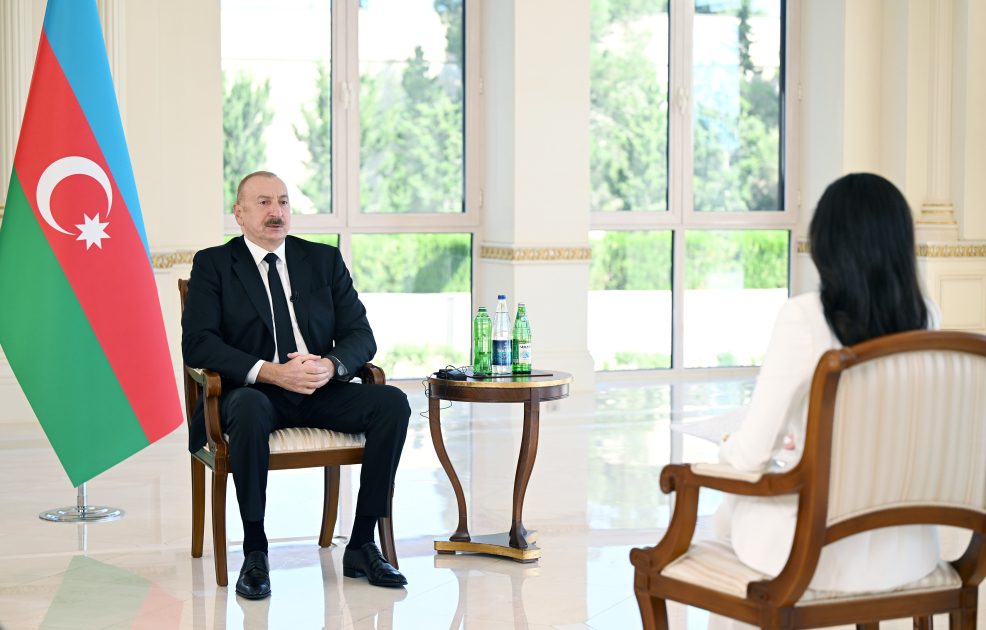BAKU, Azerbaijan, August 29. Amid increasing turbulence in global politics and rising economic challenges, the countries of the Organization of Turkic States (OTS) are prioritizing the strengthening of their mutual ties. At the heart of this process is Azerbaijan, which in recent years has emerged not only as a founding member of the organization but also as a platform shaping its strategic agenda. Baku is steadily becoming a hub for decision-making and long-term planning, guiding economic, transport, and political integration across the Turkic world.
In an interview with Al Arabiya, President Ilham Aliyev stressed that Azerbaijan was always straightforward in strengthening this institution.
"It started as a kind of group of countries, as a consultative group, as a council, but then it transformed. It has a great potential. Our close relations with Türkiye are now based on Alliance Declaration, which we signed with President Erdogan in Shusha in 2021, which makes us military allies and political allies. From legal point of view, it's important factor, not only for both countries, but for the whole Turkish world. Last year, we signed the alliance agreement with Uzbekistan and also with other members of Organization of Turkic States. We have strategic partnership agreements or declaration," the head of state said.
Regular summits and ministerial meetings underscore Azerbaijan’s growing influence within the OTS. In 2024, the Karabakh Declaration was adopted in Shusha, highlighting priorities such as sustainable development, logistics, and climate action. In 2025, a similar discussion took place in Budapest, with transport connectivity and security taking center stage.
Sectoral meetings are also becoming increasingly important. In May this year, Baku hosted the interior ministers of OTS member states, focusing on combating transnational threats and strengthening law enforcement. This reflects how cooperation within the organization is expanding beyond just economic and transport issues.
As President Ilham Aliyev rightly pointed out, the countries of the OTS share common roots, which makes this organization unique.
"Because if you look at other international organizations, not all - or perhaps only some - are united by a common ethnic group. Yeah, we are different peoples, but we have all common… our roots, coming from the Turkic ethnicity, we have growing population, which is also important factor for every country. When it is supported by economic development, it is advantage," the head of state noted.
Azerbaijan continues to take a leading role in developing transit routes, serving as a key hub for Central Asia’s access to European markets.
Over the past two decades, the country has built and modernized more than 21,000 kilometers of roads, over 1,500 kilometers of railways, and hundreds of bridges and tunnels. Major projects such as the North-South corridor, the Middle Corridor, the Baku-Tbilisi-Kars railway, and the Baku International Sea Trade Port have greatly enhanced Azerbaijan’s position in global logistics.
"When we talk about today, about corridors, you cannot avoid us. You cannot; you should use us, our territories, our facilities. Also important is that in all members of organization, there is a political stability, and friendly relations between each other and between all so this really makes organization unique. So we need to strengthen it, and we need to strengthen it by concrete projects, by investments, by energy, by transportation, by cultural projects," President Ilham Aliyev added.
A key element in this strategy is the Zangezur Corridor. What was once just a concept is now taking concrete shape: the railway on Azerbaijani territory is nearly complete, and by spring 2026 it is expected to handle an initial capacity of 15 million tons of cargo per year. This project not only enhances transport connectivity across the region but also underscores Azerbaijan’s role as a reliable hub for economic and energy stability.
The next major milestone will be the OTS summit in Gabala in fall 2025, where priorities for transport integration, streamlined customs procedures, and the development of green financing are expected to be set.
President Ilham Aliyev also outlined the organization’s broader mission: "So I see in the future this organization as one of the important global actors. So, our view is to transform it into a global actor which can play a role on international arena, which not only be preoccupied with our internal issues, but to play a stabilizing role on international arena, positive role, generating opportunities for the neighbors, and demonstrating that on such a huge geographic geography, you can build a strong unity, which is not a threat to anyone, but which is an opportunity to many," the head of state said.
Azerbaijan’s role within the OTS goes far beyond symbolic or formal participation. The country has become a true hub of initiatives, shaping the strategic agenda of the entire organization. Its transport and energy infrastructure projects reinforce Azerbaijan’s position as a key node for international trade and regional stability.
President Ilham Aliyev’s political will allows Azerbaijan to guide the OTS’s strategic direction and advance major infrastructure projects that bring the Turkic world closer together. Under his leadership, the organization not only strengthens its position in the region but also gains the potential to become an influential player on the global stage.
Azerbaijan shows that the OTS can emerge as a powerful actor internationally, capable of uniting countries around common goals, driving economic development, and providing a stabilizing influence in global affairs. Baku’s approach demonstrates that strong unity within the Turkic world is not only a tool for internal cooperation but also a resource for creating opportunities for neighboring countries and partners across the region.







